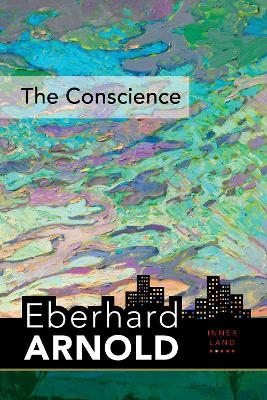
The Conscience
Plough Publishing House (Verlag)
978-0-87486-247-8 (ISBN)
When troubled consciences find healing they become a force for good.
The conscience, our inner moral compass, is a sensitive instrument meant to warn us against all that might endanger our life and happiness. Many today despise or ignore the conscience, calling its working unhealthy repression of natural urges, or rejecting any certainty in the name of relativism. Others are tormented by its accusations.
In this little book, Arnold points the way to complete healing and restoration of even the most troubled conscience. When Christ’s forgiveness sets the conscience free and floods it with his live-renewing spirit, it becomes an active force for good, giving us clarity in personal, social, and political questions and leading us to peace, joy, justice, and community.
The Conscience is the second volume of five in Inner Land: A Guide into the Heart of the Gospel.
About Inner Land
A trusted guide into the inner realm where our spirits find strength to master life and live for God.
It is hard to exaggerate the significance of Innerland, either for Eberhard Arnold or his readers. It absorbed his energies off and on for most of his adult life--from World War I, when he published the first chapter under the title War: A Call to Inwardness, to 1935, the last year of his life.
Packed in metal boxes and buried at night for safekeeping from the Nazis, who raided the author’s study a year before his death (and again a year after it), Innerland was not openly critical of Hitler’s regime. Nevertheless, it attacked the spirits that animated German society: its murderous strains of racism and bigotry, its heady nationalistic fervor, its mindless mass hysteria, and its vulgar materialism. In this sense Innerland stands as starkly opposed to the zeitgeist of our own day as to that of the author’s.
At a glance, the focus of Innerland seems to be the cultivation of the spiritual life as an end in itself. Nothing could be more misleading. In fact, to Eberhard Arnold the very thought of encouraging the sort of selfish solitude whereby people seek their own private peace by shutting out the noise and rush of public life around them is anathema. He writes in The Inner Life:“These are times of distress. We cannot retreat, willfully blind to the overwhelming urgency of the tasks pressing on society. We cannot look for inner detachment in an inner and outer isolation...The only justification for withdrawing into the inner self to escape today's confusing, hectic whirl would be that fruitfulness is enriched by it. It is a question of gaining within, through unity with eternal powers, a strength of character ready to be tested in the stream of the world.”
Innerland, then, calls us not to passivity, but to action. It invites us to discover the abundance of a life lived for God. It opens our eyes to the possibilities of that “inner land of the invisible where our spirit can find the roots of its strength and thus enable us to press on to the mastery of life we are called to by God.” Only there, says Eberhard Arnold, can our life be placed under the illuminating light of the eternal and seen for what it is. Only there will we find the clarity of vision we need to win the daily battle that is life, and the inner anchor without which we will lose our moorings.
Eberhard Arnold (1883–1935) studied theology, philosophy, and education at Breslau, Halle, and Erlangen, where he received his doctorate in 1909. He became a sought-after writer, lecturer, and speaker in his native Germany. Arnold was active in the student revival movement sweeping the country and became secretary of the German Christian Student Union. In 1916 he became literary director of the Furche Publishing House in Berlin and editor of its monthly periodical. Like thousands of young Europeans, Eberhard Arnold and his wife Emmy were disillusioned by the failure of the establishment – especially the churches – to provide answers to the problems facing society in the turbulent years following World War I. In 1920, out of a desire to put into practice the teachings of Jesus, the Arnolds and their five young children turned their backs on the privileges of middle-class life in Berlin and moved to the small German village of Sannerz. There, with a handful of like-minded seekers who drew inspiration from the Youth Movement, the sixteenth-century Anabaptists, and the early Christians, they founded an intentional community on the basis of the Sermon on the Mount. The community, which supported itself by agriculture and a small but vibrant publishing house, attracted thousands of visitors and eventually grew into the international communal movement known as the Bruderhof.
| Erscheinungsdatum | 13.02.2019 |
|---|---|
| Reihe/Serie | Eberhard Arnold Centennial Editions |
| Zusatzinfo | Illustrations |
| Sprache | englisch |
| Maße | 139 x 209 mm |
| Themenwelt | Religion / Theologie ► Christentum ► Kirchengeschichte |
| Religion / Theologie ► Christentum ► Moraltheologie / Sozialethik | |
| Religion / Theologie ► Christentum ► Pastoraltheologie | |
| ISBN-10 | 0-87486-247-7 / 0874862477 |
| ISBN-13 | 978-0-87486-247-8 / 9780874862478 |
| Zustand | Neuware |
| Haben Sie eine Frage zum Produkt? |
aus dem Bereich


